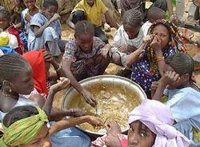Global food crisis affects over 44 million people
 On April 15-16, G20 countries at a meeting of finance ministers and central banks of G20 in Washington discussed the possible steps to enhance measures to ensure food security. This issue was first discussed at such a high level because the situation is extremely serious. Due to the growth of population in the world over 44 million people live below the poverty line.
On April 15-16, G20 countries at a meeting of finance ministers and central banks of G20 in Washington discussed the possible steps to enhance measures to ensure food security. This issue was first discussed at such a high level because the situation is extremely serious. Due to the growth of population in the world over 44 million people live below the poverty line.
Late last week the deputy head of the Russian Ministry of Finance Sergei Storchak said that the G20 countries were preparing a big package of measures to address food security. According to him, the agenda for financial managers of G20 included no less than 30 policy measures related to food security. Storchak said that "no one doubts that that this issue has a financial component, but nevertheless the main aspect of food security is the ministers of agriculture," RIA Novosti reported.
According to the World Bank, the number of those affected by the global food crisis has already exceeded 44 million people. Countries exporting food are calculating revenue for the next harvest in anticipation of the new season. According to Moskovsky Komsomolets, in March global inflation has accelerated in most regions of the world. Inflation in the Euro zone last year amounted to 2.7%. In the U.S., where the economists have long feared deflation, in March the annual price increase amounted to 2.7% as well (in February - 2.1%). Emerging economies also show price increase. In India, consumer prices over the past 12 months increased by nearly 9%, while in February this number was at 8.3%. Annual inflation accelerated in China as well and amounted to 5.4%. A comparable increase in prices was observed over two years ago when in July of 2008 prices rose by 4.9%. Food prices in the country experienced even more significant increase at 11.7% compared to March of 2010.
Recently the World Bank has been raising the issue of food security increasingly more frequently. The latest report of the World Bank dedicated to food prices is not encouraging. As recently reported by Bigness.ru, in four months from October 2010 until January 2011, prices grew by 15%. This trend is the most disastrous for people with low incomes. World Bank President Robert Zoellick, commenting on the results of the study, stressed that food prices in the world have reached a dangerous level. This problem has already become the world's greatest danger as the number of people living on 1.25 dollar a day has been steadily increasing. The World Bank report indicated that food prices continue to go up. The food price index calculated by the World Bank has increased in the period from October 2010 to January 2011 by 15%. The prices of everyday consumer goods increased dramatically, including wheat, corn, sugar, butter and rice.
The experts consider the Middle East and North Africa to be the most volatile regions today. There are also concerns related to Armenia, Georgia, Kyrgyzstan, Moldova and Tajikistan, where the majority of the population falls into a low income category. At the same time, a number of exporting countries may have a significant advantage. In particular, Azerbaijan, Kazakhstan, Russia, and Ukraine are benefiting from the price increase that can contribute to the economic growth and improvement of current account transactions.
Before the meeting of G20, Storchak stressed that the countries conducted a great deal of preparatory work in regard with consolidation of the collection of information about reserves available, delivery routes, and new crops prospects. He also added that the attempts to reach consensus in the understanding of the severity of food insecurity have been brought to a new level. In any case, solving the issue of supplying people with the right amount of food should occupy the minds of not only those who do it as a job. In addition to direct benefits there is also such a concept as responsibility, at least for future generations. In the near future agriculture ministers will discuss the issue of global food security at an entirely different level.
Irina Loseva
Bigness
Subscribe to Pravda.Ru Telegram channel, Facebook, RSS!




